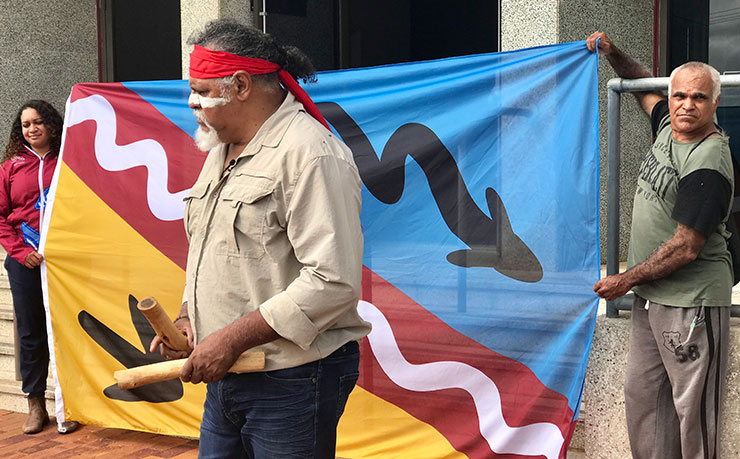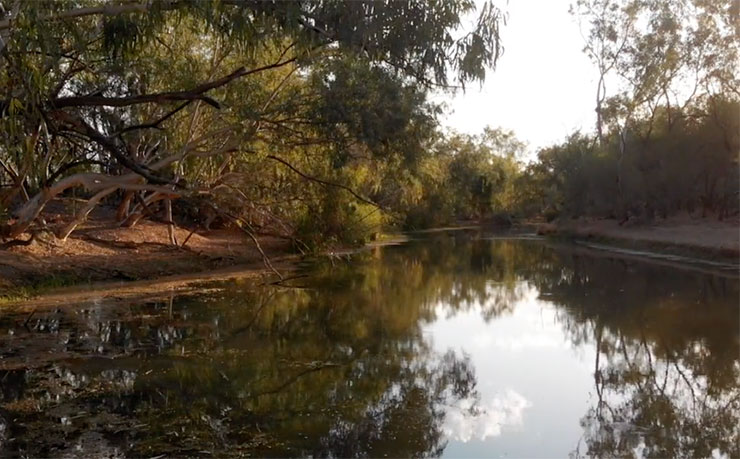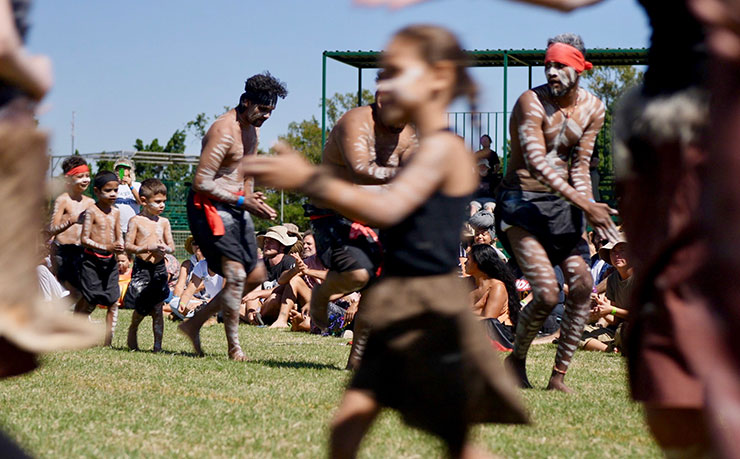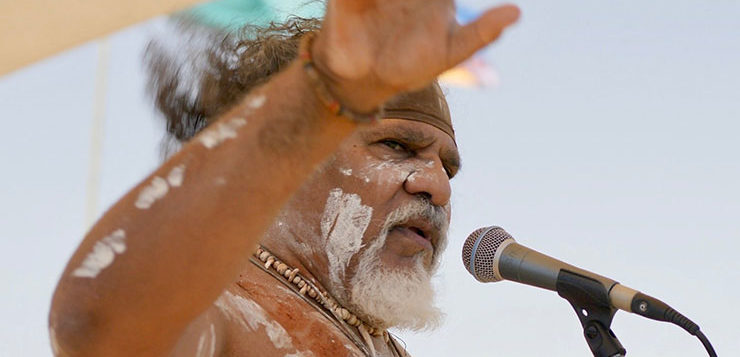DON’T MISS ANYTHING! ONE CLICK TO GET NEW MATILDA DELIVERED DIRECT TO YOUR INBOX, FREE!
Far-right politicians turned out in force in a small Queensland town recently, to back the construction of a coal-mine that will have more emissions in its lifetime than a small country. Kristen Lyons was there as well, along with the traditional owners of the country, determined to write their own future.
The central Queensland town of Clermont – over 1,600 kilometres from Canberra – just became a key battleground in the Federal election campaign. But this political flashpoint has been a long time coming.
The shenanigans that played out in this small town recently have exposed a nation divided over Adani’s proposal to build Australia’s largest coal mine, and reaffirmed that the Wangan and Jagalingou Family Council (W&J Council) are central in the battle over the mines’ future.
What happened in this country town, fearing it’s decline as coal continues on its terminal trajectory, was no surprise. Clermont is the closest town to Adani’s mega mine site in the Galilee Basin. It’s here some locals (along with a bag full of pro-coal federal and state politicians) hold fast to the illusive dream of jobs and growth that Adani and their political backers promise will be realised if their mine goes ahead.
Clermont, and most of the Galilee Basin, is also Wangan and Jagalingou country. Here, the W&J Council are waging an internationally significant political and legal fight in defence of their country against destructive coal mining. They have been doing so since they first rejected Adani in 2012, and for over four years of active campaigning and resistance; and they have been custodians of their land, including as protectors of their water, people, history and totems, for untold thousands of years.
On the back of W&J Councils’ fearless defence of country, the Bob Brown Foundation convoy, and along with a fistful of federal politicians with an apparent mandate to fuel fear and hate against them, rolled into Clermont for what became an explosive weekend. Yet amidst all the noise alongside this collision of forces, Adrian Burragubba – W&J Council cultural leader – explained, “this is our story book”.

That weekend of conflict is just a bit part in the much bigger story being written by the custodians of Wangan and Jagalingou country. This is a story of their sustained fight for recognition of Indigenous rights in Australia, including their right to free, prior and informed consent, and their pivotal role as water protectors in asserting ‘Adani – No Means No’.
W&J Council Greeted by ‘Start Adani’ Fanfare
Around 40 family members from the W&J Council arrived into Clermont in the lead up to the weekend. They were on country for Council business, cultural events – including hosting their Karmoo Dreaming celebration – and for some, a visit to the sacred Doongmabulla Springs.
As a social scientist engaged in collaborative research with the W&J Council, I was part of this contingent.
Rolling into town, the family council was greeted with a tickertape parade of ‘#Start Adani’ placards and other colourful pro-coal fanfare. Local pubs and some other small businesses also warned that opponents of Adani’s proposed mine ‘won’t get food or drink inside’.
There was no missing this unwelcome mat, but in case we did, driving up the main street of town one man yelled “F..k off home”. For Wangan and Jagalingou custodians, of course, this is home.
This arsenal of hate wasn’t necessarily directed at the W&J people there. It was intended for the Bob Brown Foundation’s Stop Adani convoy that was scheduled to arrive into the town on Saturday afternoon. Clermont was the U-turn for this ‘festival of democracy’ – as Bob Brown called it – that started in Hobart, and ended in Canberra on Sunday, 5 May.
This travelling protest stopped in towns along a route that crossed four Australian states as part of its aim to keep climate and environment on the agenda in the lead up to what some have dubbed the Adani Federal election.
A Political Circus Comes to Town
Before Bob Brown and his followers arrived, however, a political theatre had already played out. A who’s who of far-right politics – Clive Palmer, Pauline Hanson and Matt Canavan – visited on Saturday as part of a fly-in-fly-out mission that fuelled intolerance towards opponents of Adani’s proposed Carmichael mine. It is beyond doubt that Adani is dominating conservative politics in central Queensland and a host of marginal seats that would be essential to help the Coalition get back over the line.
These politicians joined a pro-coal pub crawl up the main street of town, each delivering an address akin to a half-time footy changeroom pep talk to crowds of Adani supporters, who brandished ‘proud coal miner’, ‘I support jobs and rights for coal miners’, and other banners.
On the one hand, this political spectacle was farcical, by showcasing just how spoilt for choice Queensland is when it comes to dangerous and far-right politicians. But it must also be called out, along with its barrackers in the provincial and state media, for stirring up a pro-Adani ground crew in advance of the arrival of the Bob Brown led convoy and turning Clermont into a conflict zone.
As Adrian Burragubba has succinctly described, Australian politicians must be seen for what they are doing; “running a protection racket around Adani”.
Clermont becomes a Conflict Zone
The frontline of this conflict comprised locals and their interloper backers, who in combination bared arms in defending ‘their town’ against anti-Adani protesters; throwing stones and verbal abuse at the convoy of cars carrying families that drove into town.
It also included setting off crackers in the dead of night – that sounded similar to gun fire – in close proximity to where these same families slept in the Clermont showgrounds, as well as multiple fly overs in a mustering chopper into the night. This soundscape, alone, felt like a conflict zone for some. The vastly increased police presence in town over the weekend was a further reminder that Clermont had become a tinderbox of oppositional politics ready to ignite.
A culture of intimidation also silenced support for the Bob Brown convoy. For one local restaurant that took a booking for 40 people that were part of the convoy for dinner, for example, alleged threats from locals that their restaurant would be boycotted forced them to cancel. Despite this, some locals did speak out, including as tensions continued to rise.
This showdown was endorsed by Adani. This was evidenced in their public thank you to the Liberal, National, and One Nation Parties – who have each received funding from Adani – alongside Clive Palmer’s United Australia Party, and the people who came into Clermont to support them in their ‘protest the protesters’ rally.
This showdown was also orchestrated despite the reality that, as one of Australia’s foremost economists, Professor John Quiggin (2019) explains, “the Carmichael mine is unlikely to go ahead, and most people know it”.
The Karmoo Dreaming: a Celebration of the Water Protectors
But the weekend in Clermont wasn’t about the show put on by Adani or their right-wing political mates. It was about the generous and sacred Karmoo Dreaming celebration of the water protectors.
This event was organised and hosted by the W&J Council to celebrate their culture and law, including honouring their vital role, over millennia, as custodians of their lands and water. W&J Council welcomed the Bob Brown Foundation convoy onto their country, and into the Karmoo (water) ceremony and celebration.

For W&J people, water is central to their struggle, including the fight to defend their most sacred site, the Doongmabulla Springs, from destruction by Adani’s proposed Carmichael mine. Adrian Burragubba has said.
“The water is our life. It is our dreaming and our sovereignty. We cannot give that away…. Water is central to our laws, our religion and our identity. It is the Mundunjudra, the water spirit, the rainbow serpent.”
The Karmoo Dreaming held on Sunday 28 April was a celebration of W&J’s unbroken ancestral chain as water protectors, including the sacred Doongmabulla Springs. The Karmoo Dreaming celebration was not a protest. Nor was it a #StopAdani event.
It was a gift of W&J’s song and dance, alongside other cultural performances, as well as performances by well-known Australian musicians Neil Murray and Monique Brumby. The event provided a unique opportunity for the Bob Brown convoy to meet with members of the W&J Council, and to increase their understandings of what is at stake for Wangan and Jagalingou people if this mine were to proceed.
Importantly, it provided a platform to learn more about the remarkable battle the W&J Council continues to sustain, despite the native title colonialism stacked against Indigenous people. It also enabled some members of the W&J Council to learn who Bob Brown was.
In a powerful assertion of their sovereignty, the W&J Council raised their flag to dance in the wind over the town of Clermont and the Clermont Showgrounds. This flag raising signified Wangan and Jagalingou’s primary connection as the first nation and traditional custodians of this area.

This determined expression by the W&J Council of their rights – under their own law and customs, and under their own flag – is grounded in their knowing that “water is our life, our dreaming and our sovereignty”. On the basis of this relationship to country, Adrian Burragubba defiantly explains “Adani can’t have the land. They can’t have the water. Not at any price.”
The W&J Councils’ invitation to the Bob Brown convoy provided a unique opportunity for them to ‘stand behind’ Wangan and Jagalingou custodians in their defence of country. In his acknowledgement of this relationship, and of Wangan and Jagalingou people as central in Adani’s federal election battle, Bob Brown stated “This is not coal country, this is not Adani country, this is Wangan and Jagalingou Country”.
Water Protectors write their own story
It has now been well reported that this peaceful and at times sacred gathering was disrupted when a man rode a horse into the crowded showground. This was an act of trespass and intimidation, with the rider leading his horse around a tent where Wangan and Jagalingou elders sat.
In this senseless and deliberate act, heavy hooves broke ground less than a metre from where small children played and others were sitting. One woman sustained injuries during a hit and run from this man on his horse; and a peaceful gathering was left in shock from bearing witness to this blatant disregard for human safety.
The injured woman was transported to the Mackay hospital and the horseman has been charged with dangerous operation of ‘a vehicle’ – namely, the horse – causing grievous bodily harm, common assault, trespass and obstructing police. The W&J Council condemned this attack, saying that “this assault was a consequence of the fear and loathing being stirred up by right wing politicians who came to Clermont”.
It also closed the circle on their historical experience. “This attack took place on our country at our event. This is an attack on us… People charging horses through our ‘camp’ is familiar from this region’s colonial history, which our people suffered immeasurable harm from. It reminds us of the fear and intimidation that is still used to try to silence us”.
Regardless of this violent incursion, the Karmoo Dreaming celebration is a highly significant moment during ‘the Adani federal election’ campaign. This gathering – on Wangan and Jagalingou country – has affirmed unity amongst opponents of Adani’s proposed mine. It has also affirmed the central role of the W&J’s family council as water protectors in defence of their country against Adani.
The Karmoo Dreaming celebration also embodied the W&J Council’s sustained assertion of sovereignty. In so doing, the W&J Council are writing their future; irrespective of the settler colonial society and the violent history upon which it is built.
The W&J Council have placed water at the centre of their struggle for their rights and their country. Their sustained defence of their country brings together their spiritual, cultural and economic responsibilities, alongside their aspirations for a self-determined future beyond big coal.
It is on this basis the W&J Council maintain their fight, including taking it to a full bench of the Federal Court in late May, and beyond if necessary.
In his rousing speech at the Climate Rally in Canberra on Sunday – just days after a visit to the Little Moses spring on his country – Adrian Burragubba declared:
“The issuing of a water license by Federal Environment Minister Melissa Price was a declaration of war against our people…. Only the law of the land determines who we are as a people. It is our past, it is our present, it is our future. This is our dreaming, and this is why we stand so strong against the Adani project.
“We haven’t consented to that mine. And it’s not going to happen. No contract. No consent. Adani, No Means No.”
DON’T MISS ANYTHING! ONE CLICK TO GET NEW MATILDA DELIVERED DIRECT TO YOUR INBOX, FREE!
Donate To New Matilda
New Matilda is a small, independent media outlet. We survive through reader contributions, and never losing a lawsuit. If you got something from this article, giving something back helps us to continue speaking truth to power. Every little bit counts.




